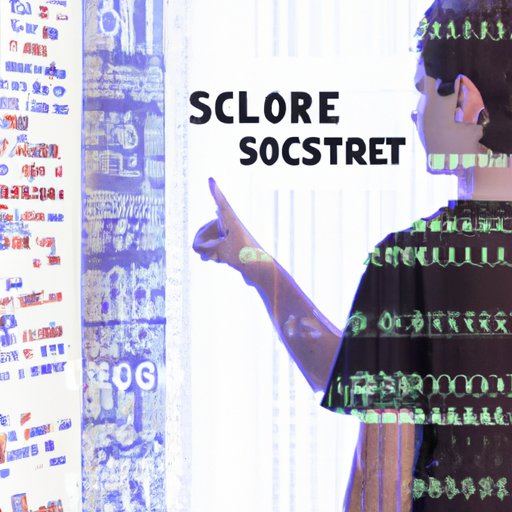Introduction
Computer science and coding are quickly becoming essential skills for success in today’s digital world. The ability to understand and manipulate code can give you a leg up in the job market and open up new opportunities that may have previously seemed out of reach. But what exactly is coding and how do you learn to code in computer science? This article will explore these questions in depth, providing an overview of the benefits of coding, a guide to understanding the basics, tips from experts on how to get started, and a glimpse into the future of coding and computer science.
Exploring the Benefits of Learning to Code in Computer Science
Learning to code in computer science can have a number of benefits for both personal and professional growth. From improved problem-solving skills to increased job opportunities, coding can open up a world of possibilities. Let’s take a closer look at some of the key advantages of learning to code.
Improved Problem-Solving Skills
One of the most important benefits of learning to code is that it can improve your problem-solving skills. Coding requires you to think critically and break down complex problems into manageable pieces. This type of analytical thinking can be beneficial in all areas of life, from work to personal relationships.
Increased Job Opportunities
Another advantage of learning to code is that it can lead to increased job opportunities. As technology continues to evolve, the demand for coders with specialized knowledge and skills is growing. Companies of all sizes are looking for individuals who can create, maintain, and troubleshoot software applications. Having coding experience on your resume can make you a more attractive candidate for a wide range of positions.
Enhancing Creativity
Finally, coding can help to enhance your creativity. Writing code requires you to think outside the box and come up with solutions to complex problems. This type of creative thinking can help you to develop innovative ideas and find unique solutions to everyday problems.

A Guide to Understanding the Basics of Coding and Computer Science
Now that we’ve explored some of the benefits of learning to code, let’s take a look at the basics of coding and computer science. Understanding the fundamentals of coding can help you to get started on the right foot.
What is Coding?
Coding is the process of writing instructions (code) for a computer to follow. These instructions tell the computer how to perform certain tasks or operations. Coding can be used to create websites, apps, games, and other software applications.
Types of Programming Languages
There are many different types of programming languages that can be used to write code. Some of the most popular languages include Java, Python, HTML/CSS, JavaScript, and SQL. Each language has its own set of rules and syntax that must be followed in order to create a working program.

An Overview of Different Types of Programming Languages and How They Can Help You Learn to Code
Now that you know the basics of coding, let’s take a closer look at some of the most popular programming languages and how they can help you learn to code.
Java
Java is one of the most popular programming languages and is used to create a wide range of applications, from web applications to mobile apps. Java is relatively easy to learn and has a large library of resources available to help you get started.
Python
Python is another popular programming language that is used for a variety of tasks, from web development to data analysis. It is considered to be one of the easiest languages to learn and is often used as an introductory language for beginners.
HTML/CSS
HTML and CSS are two of the most important languages for creating websites. HTML is used to structure the content of a website, while CSS is used to add styling and design elements. Both HTML and CSS are relatively easy to learn and are great starting points for anyone interested in web development.
JavaScript
JavaScript is a powerful programming language that is used to create interactive websites and applications. It is a bit more difficult to learn than HTML and CSS, but once you get the hang of it, it can be a great tool for creating dynamic websites and applications.
SQL
SQL, or Structured Query Language, is a language used to manage and interact with databases. It is used for a variety of tasks, from retrieving information from a database to updating records. Learning SQL can be a great way to expand your coding skills and open up new job opportunities.
How to Get Started with Coding and Computer Science: Tips from Experts
Once you’ve decided to learn to code, the next step is to figure out how to get started. Here are some tips from experts on how to get started with coding and computer science:
Find the Right Resources
The first step to getting started with coding is to find the right resources. There are a number of online courses, tutorials, and books available to help you learn the basics of coding and computer science. Take some time to research and find the right resources for your skill level and goals.
Practice, Practice, Practice
Once you’ve found the right resources, the next step is to start practicing. Writing code requires practice and repetition in order to master the concepts. Don’t be afraid to make mistakes – that’s how you’ll learn and grow.
Stay Up-to-Date on Latest Technologies
Finally, it’s important to stay up-to-date on the latest technologies and trends in coding and computer science. This can help you stay ahead of the curve and ensure that you’re always learning something new.

The Future of Coding and Computer Science: What it Means for You
As technology continues to evolve, the importance of coding and computer science will only increase. Here are some of the key trends that will shape the future of coding and computer science:
Increasing Demand for Coders
The demand for coders with specialized knowledge and skills is increasing rapidly. Companies of all sizes are looking for individuals who can create, maintain, and troubleshoot software applications. This trend is likely to continue in the future, making coding an even more valuable skill.
Rise of Automation
Automation is becoming increasingly important in the world of coding and computer science. Automation can help speed up processes and reduce the amount of manual labor required for certain tasks. This trend is likely to continue in the future, making automation an even more important part of coding and computer science.
Growing Interest in Cybersecurity
Finally, cybersecurity is becoming an increasingly important issue in the world of coding and computer science. Companies of all sizes are looking for individuals who can create secure software applications and protect sensitive data. This trend is likely to continue in the future, making cybersecurity an even more important part of coding and computer science.
Conclusion
Coding and computer science are quickly becoming essential skills for success in today’s digital world. From improved problem-solving skills to increased job opportunities, learning to code can have a number of benefits. This article has provided an overview of the benefits of learning to code in computer science, a guide to understanding the basics, tips from experts on how to get started, and a glimpse into the future of coding and computer science.
(Note: Is this article not meeting your expectations? Do you have knowledge or insights to share? Unlock new opportunities and expand your reach by joining our authors team. Click Registration to join us and share your expertise with our readers.)
